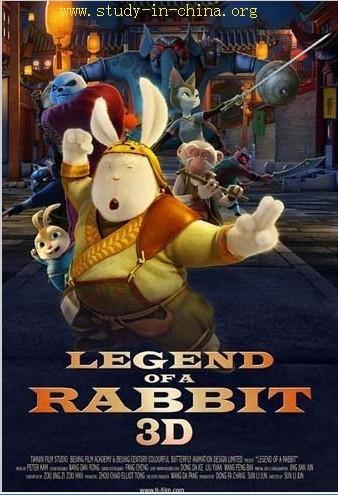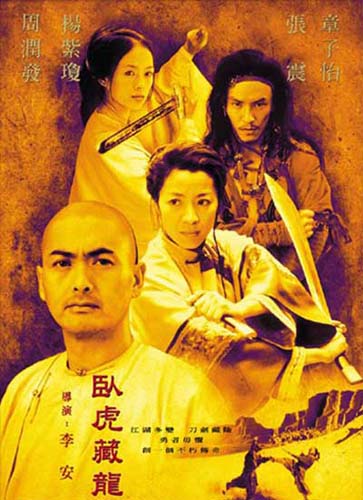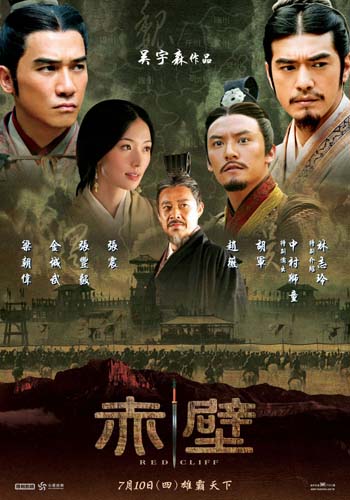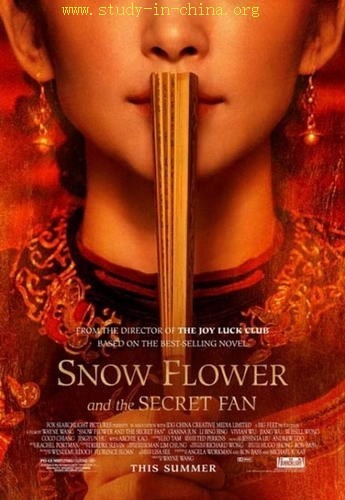Chinese Films Explore Ways to Compete with Hollywood
For Hollywood, the Chinese film market presented a splendid box-office report this summer.
And among the top five box-office hits of all time in China, three are from Hollywood: "Avatar" with 182 million U.S. dollars, "Transformers: Dark of the Moon" with 145.5 million dollars and "Kung Fu Panda 2" with 91.5 million dollars.

Poster of "Legend of a Rabbit"
However, "Legend of a Rabbit," a 3D animated movie produced completely by a Chinese team and aimed at competing with the best of the West, grossed only 16.2 million yuan (2.5 million dollars) in the Chinese market last month after its release on July 11.
The 18.8-million-dollar 3D production, which took more than 500 animators three years, on Sunday shared the Best Animation Award of Huabiao, China's highest government honor in the film industry, along with three other animations.
The different performances of China's "Rabbit" and the United States' "Panda" in the world's fastest growing movie market, whose box office gross increased by 64 percent last year to 1.5 billion dollars, also mirrored the wide gap between the box-office receipts of the two countries' films in each other's market.
In the last few years, China has become a key destination for big Hollywood films. "Avatar," "Transformers: Dark of the Moon," "Inception" and "2012" all grossed more ticket numbers in China than they did anywhere else outside the United States.
However, Chinese films, even the blockbusters at home such as the earthquake drama "Aftershock," could not make a success on the U.S. market.

Poster of "Crouching Tiger, Hidden Dragon"
SUCCESSES RARE FOR CHINESE FILMS IN U.S. MARKET
Chinese-made films were first launched in North America in the 1980s.
However, successes had been rare until December 2000, when "Crouching Tiger, Hidden Dragon," a kungfu drama directed by Ang Lee, hit the screen.
As the most profitable Chinese film, the movie, released by Sony Pictures Classics, grossed a total of 128 million dollars in roughly 2,000 theaters in the United States.
Almost four years later, "Hero," a smash directed by Zhang Yimou and distributed by Miramax, made another wave by garnering 53.7 million dollars in ticket sales, making it the second most profitable Chinese film in the U.S. market and a No. 1 movie at the U.S. box office for two weeks in a row.
But still, many Chinese films have met with failures in terms of box office record after brief showings in a small number of U.S. theaters.
"Aftershock," which grossed over 100 million dollars in China, earned only 60,954 dollars in 25 U.S. theaters. John Woo's 80-million-dollar "Red Cliff" netted merely 627,047 dollars in 42 U.S. theaters in 2009.
China Lion Film Distribution, a Los Angels-based company that distributes Chinese-language films via an exclusive deal with AMC, North America's No. 2 theater chain, for the U.S. and Toronto markets, has distributed several Chinese-language films in the United States over the last year, including "Aftershock," "The Warring States," "A Beautiful Life" and "If You Are the One II."
"If You Are the One II," a romantic comedy directed by Feng Xiaogang, earned 427,000 dollars, with more than 90 percent of the viewers being Chinese or Chinese Americans.
Such earnings, humble even by Chinese standards, are already much better than other Chinese films released in the United States. Most of the Chinese-language films were just screened in around 20 U.S. theaters. Over the decade, although Chinese films have increased their presence in U.S. theaters, most U.S. moviegoers still tend to patronize Chinese martial arts films rather than straight dramas or comedies.
Those Chinese films that are not kungfu movies are usually screened in "art house" cinemas in major cities - the main location for foreign-language films from around the world.
"Chinese films in the United States are subject to market forces," said Richard L. Anderson, an Oscar winner in sound effect. "The U.S. distribution companies are audience-driven. They buy what they think they can sell here."

Poster of "Red Cliff"
STORY-TELLING IS THE BIGGEST ISSUE
Then, what are the reasons that make the "audience-driven" U.S. distribution companies think Chinese films are not marketable?
Foreign-language films rarely find more than a niche audience in the United States. Their tastes and cultural preferences obviously are barring them from watching Chinese-language films.
"Red Cliff" ended in a fiasco with only 627,047 dollars on the U.S. market. But in Japan, the film quickly became a phenomenon when it opened in 2008 and was one of the hottest movies that year.
Besides hot actors in the movie, Japanese viewers' knowledge of the Chinese novel "Romance of the Three Kingdoms," which the movie was adapted in part from, served well.
It was the same case in France for "Detective Dee and the Mystery of the Phantom Flame." The kungfu movie, directed by Tsui Hark, did fairly well when it opened in the European country in April. It ranked the ninth in the French box office back then, an excellent performance for a foreign film.
Experts say that the success of the movie was due to the French people's familiarity with the main character, Detective Dee, who had been made famous in Western countries by late Dutch diplomat and writer Robert Van Gulik.
Van Gulik translated "Dee Goong An (Stories of Detective Dee)," an 18th-century Chinese detective novel, into English and used it as the basis for his own series of detective novels about Judge Dee.
Besides the preference of the U.S. audience to local films, Chinese films have their own problems.
Technology has always been an integral part of filmmaking. But lack of professionals in filmmaking has plagued the Chinese industry for years.
Feng, director of "Aftershock," said that when he shot the earthquake drama, numerous disaster scenes had to be processed abroad.
Although there was an imported apparatus with more than 5,000 functions of audio and visual effects, the machine could not play its due role "because technicians can only use perhaps 500 of them," Feng said.
Meanwhile, although there are a small group of actors, directors and producers at the top of the movie industry who are extraordinarily successful, talent among screenwriters and directors has not been actively cultivated.
"Money is not the problem. The film industry is desperate for creative talent," said Wang Zhongjun, chairman of Huayi Brothers Media Group, China's first listed private film company.
Three years ago, when "Kung Fu Panda" broke the Chinese box office record for highest-grossing animated features with 180 million yuan (26 million dollars), many questioned why the DreamWorks film had not been made by a Chinese company, as it borrowed heavily from Chinese culture.
For years, local moviegoers have been complaining why Chinese animations could not be as funny and palatable as their Hollywood counterparts.
"Dinosaur Baby," a local animation screened in April and May, lost out to Fox's "Rio." When "Legend of a Rabbit" was released last month, many questioned the originality of the movie, saying it was just an imitation of "Kung Fu Panda" and even the posters were alike.
The U.S. audience's preference to domestically produced movies and China's lag in filmmaking technology are certainly obstacles, but insiders say that story-telling seems to be the biggest problem that fails Chinese films in both domestic and foreign markets.
Mark Osborne, one of the directors of "Kung Fu Panda," once said that if Chinese animation filmmakers want to learn something from Hollywood, they should learn "how to tell an interesting story."
Hollywood's story-telling methods are not unique to the United States but are universal ways to attract human souls, he said.
Yin Hong, a professor of film and television studies with Beijing-based Tsinghua University, said that Chinese films have not yet found a cultural and artistic strategy for telling a Chinese story with a global perspective and for expressing universal cultural values through film language.
"The American society is such a multi-racial, multi-cultural culture that they have been able to make movies for the lowest common denominator," said Chris D. Nebe, an acclaimed Hollywood writer, producer and director. "That's why everybody understands them and likes them."

Poster of "Snow Flower and the Secret Fan"
CO-PRODUCTION A WAY OUT
China has been endeavoring to let its films go global in ways including participation in various film markets and renowned international film festivals.
But among the efforts, experts say creative partnerships between Chinese and foreign companies are one of the most important and effective ways.
Co-production can help not only to grow China's own industry but also to export Chinese movies. Introducing Chinese movies to the world is part of China's cultural strategy that helps to build up its soft power.
"To increase our share in the international film market, we must spend much more efforts on film promotion and marketing," said Yang Buting, board chairman of China Film Promotion International.
"Hollywood's successful global distribution system will benefit Chinese films through co-production. To cooperate with foreign companies, it will be their job to distribute the film in their countries. This is much more effective than selling the film by ourselves," said Yang.
Actually, partnerships between Chinese and Hollywood moviemakers have been proliferating. Oscar-winning actor Christian Bale played the leading role in Zhang Yimou's "The 13 Women of Nanjing."
Meanwhile, Mike Medavoy, producer of "Black Swan," who was born in Shanghai, is working with Beijing-based film promoters to help Chinese films go global. Hugh Jackman starred in "Snow Flower and the Secret Fan," Wendi Murdoch's first co-produced movie.
In addition, Oscar winner Branko Lustig, producer of "Schindler's List," has announced his plan to produce "The Melanie Violin," a movie about Jewish refugees in Shanghai during the Second World War.
In one of the latest big moves, Huayi Brothers Media, China's largest independent film studio, and Los Angeles-based production company Legendary Entertainment, maker of such global box-office hits as "Inception" and "The Dark Knight," formed in June a new China-U.S. venture called Legendary East.
Earlier this month, the newly-formed, Hong Kong-based and Chinese-managed entertainment company announced its first project: "The Great Wall," which is designed to be a "globally-appealing" adventure movie and will be directed by Edward Zwick, director of "The Last Samurai."
In China, the project will be distributed by Legendary East's co-production partner, Huayi Brothers. Warner Bros. is expected to handle other territories.
As China is advancing fast, especially in film financing and distribution, some have warned that what is more important is the real quality of movies.
"I know some films were done in only a month. No one talked thoroughly of the screenplay. It is not this case in Hollywood. A good screenplay needs to be worked on time and time again," said Gong Li, one of the best known Chinese actresses in Hollywood.
Since 2005, the Chinese government has invested heavily in infrastructure projects, including new theaters in China's major cities. There are now more than 6,000 screens across the country, and many of them are digital. In 2010, more than four screens were set up every day.
But with the high speed of hardware development, the artistry of Chinese films is yet to improve. According to Yin, the Tsinghua University professor, only about 100 of the 500-plus movies produced in China last year met acceptable art standards.
"It is easy to buy buildings, for example, and see the cash flow. It is harder to go into the software business of making films. It has to be done methodically and in a way that makes both economic and strategic sense," said Medavoy, producer of "Black Swan."
Meanwhile, Dan Mintz, CEO of DMG Entertainment, pointed out that identifying the target audience group is the key to success for co-produced works. It is either an international film with Chinese elements or a Chinese film with global faces.
For a Chinese filmmaker to win over the U.S. viewers, the most important thing is that he has to incorporate the Chinese elements with Western ones in terms of story-telling and film techniques, said Nebe.
The Hollywood writer was involved in producing with Chinese filmmakers "Mysterious China," an award-winning series of documentaries exploring China and its 5,000-year-old culture.
"Since we want 'lao wai' (foreigners) to understand China, we have to give them information in the 'lao wai' fashion," he said.
News&Opinion
 more
more- Chinese Films Explore Ways to Compete with Holly...
- China Supports Establishment of Palestinian Stat...
- State University Offer Chinese Courses!
- China-ASEAN Education Collaboration on Fast Track
- Chinese Tourists Set to Overtake U.S. Visitors i...
- China to Develop Friendly Cooperation with South...
- Beijing, Shanghai Enjoy Highest GDP Quality in C...
- Yao Ming Says Many Ways to Extend Basketball Car...
Policy&Laws
China-EU Year of Youth Celebrated in Chinese Emb...
China-EU Year of Youth celebrated in Chine...
China-EU Strategic Dialogues
Chinese State Councilor Dai Bingguo (R, front) shakes ...
Russia Celebrates May Day Holiday
Two million Russians joined rallies by major political parties and t...





 print
print  email
email  Favorite
Favorite  Transtlate
Transtlate 







